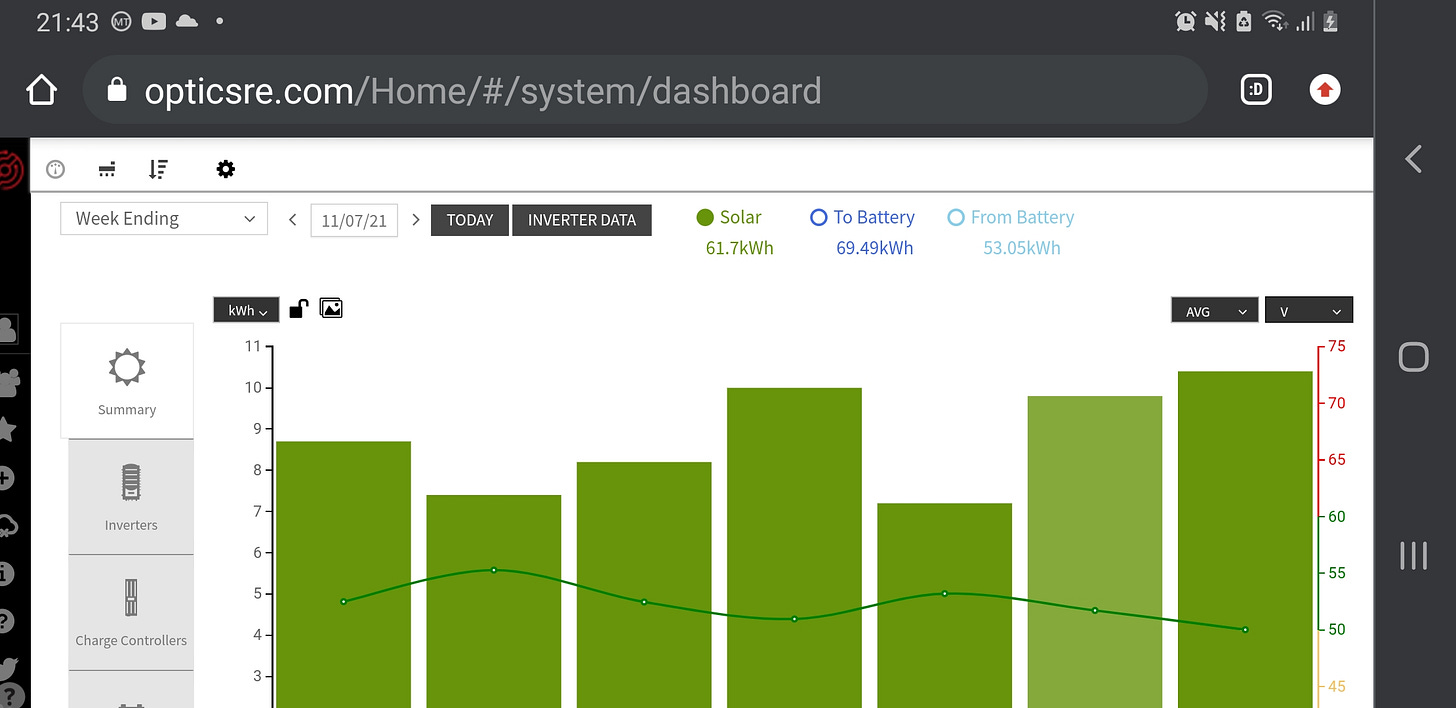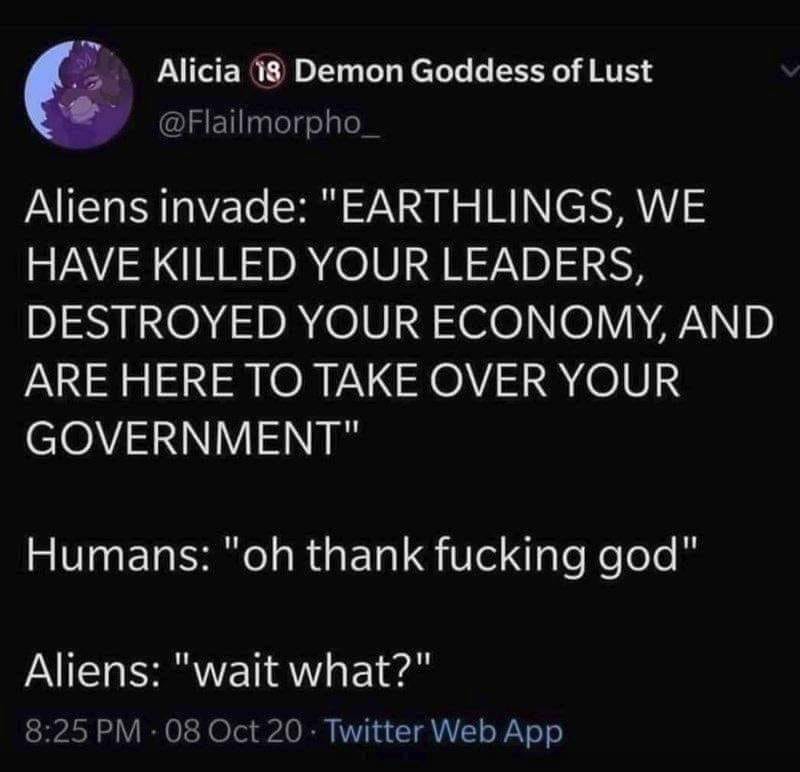My recently installed 4.275 kW array (15 panels) in Invercargill, is oriented 55 degrees from horizontal to maximise winter insolation and about 10 degrees West of solar North.
It is currently giving me anywhere between 7.2 to 10.5 kWh per day input to the batteries, against our average daily consumption of 7.5 kWh:
The average NZ home uses at least twice this much. Part of that is that we do all our water heating via wood (typically 1/3 of total household consumption, we have a Eucalyptus plantation on our property), and all our cooking via gas and wood...
Given everything going on with supply chains, I bit the bullet and purchased a spare inverter last week. Panels may last 30 years, but they're about 1/3 of the total cost of an off grid system, with another third on batteries, and another third on the inverters, charge controllers and associated switchgear. Inverters and charge controllers both have expensive parts in them which typically last 7-10 years, so you'd get through three of them AT LEAST in the lifespan of your panels. Add in replacing battery banks roughly every ten years, too.
I hopefully shouldn't have that second problem, as the NiFe battery bank we installed should outlast the panels, but that durability comes at the expense of efficiency. They're only about 65% round trip efficient, compared to 80% for lead acid or 90%+ for Li Ion. So that 7.2kWh input from the PV panels is only giving us around 5.7kWh usable electricity. And we're currently making up the difference with a diesel generator.. LoL
As such, and because I forgot to tweak that parameter in my load calculations, we'll be installing another 4.8kW array on a second roof. There's no way the first array will be gathering enough energy through the winter months (I'm expecting maybe 50% of the summertime output given I've oriented the panels to maximise winter insolation). More cabling, charger controllers, updated switchgear to deals with the higher currents, etc etc.
On the demand side, I'm taking a leaf out of Powerdownkiwi's book and configuring an outside fridge to take that load off our system for the winter months.
We justified this cost because running power to the build platform for our house would have cost the same as the initial PV installation, but it's still been a very expensive learning exercise in the realities of solar..! And, given my perspective on what comes next, this installation is as much about family risk management as efficiency.
I'm a professional engineer with a background in building energy systems and it has fairly exercised my knowledge to install and commission these PV systems over the last couple of years (I chose to do most of the installation work myself as a learning exercise). We would most definitely need energy companies, as at the scale we've done it, to power a fairly conventional house, is beyond the capabilities of most people, I can confidently say...
On the issue of recycling of the panels, which is often asked, simply, it's not profitable to recycle PV, and likely never will be. I'll again defer to an Alice Friedman article for the detail: https://energyskeptic.com/2021/metal-recycle-limited-by-many-factors/
I'll also note in passing, that grid tied solar can up to a point make a bit of a difference to balance hydro storage's winter peak output, which on the face of it seems like a good thing, if you're ignoring the more fundamental concerns I finish with below.
Plus the infrastructure for grid electricity is already there, simply requiring maintenance (not that that's a good thing when we have the Alpine Fault risk hanging over our heads in Te Wai Pounamu and could definitely benefit from more decentralised generation assets). By any realistic estimate, any serious transition to renewables at the scale required to make a serious dent in electrical energy demand, will take a major chunk off our existing energy and material resource use budget, for the couple of decades it will take to build (by which time it'll need to be rebuilt). We'd better decide what portion of the rest of the economy we can do without if we want to make serious progress in that direction....
Coming back to the title of this article: It is written partly in response to critiscisms of the Ferroni Paper from 2016 on the low EROI of Solar PV in Northern Europe. I find Alice Friedman's precis articles helpful alongside peer reviewed stuff on energy, she always includes further references, etc. https://energyskeptic.com/2021/negative-energy-return-of-solar-pv-in-northern-europe/
None of the above is speaking to the more fundamental question of EROI, but I feel it does demonstrate some of the challenges. I’m not saying don’t do solar, quite the opposite, but be clear on your reasons, and be prepared to learn! You can get started with a smaller system, like I did on our Tiny House, and learn as you go.
A great free resource that was just published is the book co-authored by Appropedia.org co-founder, Lonny Grafman: To Catch The Sun - Free ebook on Small Scale PV Systems (I also highly recommend his other free online ebook To Catch The Rain on rainwater collection systems).
I say do it on the household scale for reasons of resilience, but that isn’t going to scale to replace other energy sources. As an example of the perils of doing it on the larger scale mostly to replace coal fired electricity generation, have you read any honest analysis on Germany’s “Energy Transformation” or “Energiewende” auf Desutsch, recently: https://energyskeptic.com/2019/germanys-renewable-energy-program-energiewende-is-a-big-expensive-failure/
From an academic perspective, I'd love to put more time into detailed EROI analysis here in NZ, but...
All of the above is interesting, however I commonly refrain from getting into such detail because it misses the larger point.
None of this is possible without fossil fuels to power industrial society. Electrical energy consumption is only 1/3, roughly, of total primary energy consumption in NZ. What about the other two thirds that renewable energy can’t supply? Hydrogen?! Don’t waste my time…
We're into a period where we can expect contraction of the liquid fuel supply at something up to 7% pa , for as long as industrial output and the financial system that enables it can withstand a drop in GDP of that sort of magnitude, year after year. Personally, from my understanding of the interactions of the many factors, I don't think it'll be very long before the contraction becomes economic collapse, outright war over resources, and a precipitous drop in industrial food production...
This perspective is a sharp contrast with the endemic Bright Green narrative that thinks PV and wind turbines can solve our energy woes. I addressed a bit more on the flaws in this Bright Green narrative, which thinks that renewables are the answer, in my recent presentation to the Tasman Climate Forum - webinar recording (I’ve linked to the start of my talk, be sure to scroll back if you want to hear to whole session):
Here's my slides:
Through the Eye of a Needle (Flaws in the Assumptions behind a Bright Green Future)
rant
I'm reminded of Clarke's third law: "Any sufficiently advanced technology is indistinguishable from magic." We have far too much magical thinking, and faith in our civic religion of technology and progress, and apparently that includes within the engineering profession. Did you see the PM's recent interview with the Herald? Apparently, we'll achieve our 2030 NDC: "cuts required to meet the 2030 pledge would happen offstage, in areas of daily life that most people will barely notice."
In the interview the PM goes on to talk about decarbonisation of industry as the reason for this confidence. I wonder on what basis she makes those assertions, but then thanks to the activity of the Wise Response Society, we know that, for example, MBIE only use demand forecasting in their energy futures work. Central government is therefore structurally blind to resource constraints that biophysical economists such as Tim Morgan know are already upon us. I believe CCC will have relied on these MBIE forecasts?
They're probably also using General Equilibrium models of the impacts of climate change too, which Steve Keen has comprehensively deconstructed.
I'd lol, but it really isn't funny. Whoever has given her that advice should be taken out and dealt with...
Greta was on point in her speech in the final stages of COP26:
As is this meme:
Hey leaders: It doesn’t have to be this way!! Maybe you should undertake some learning on what the Transition looks like, and how to operationalise it! https://www.thq.nz/learning-journeys
/rant
I’ll be coming back to these issues in future posts.





